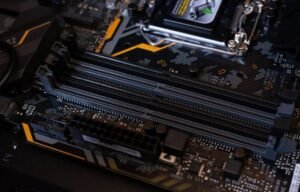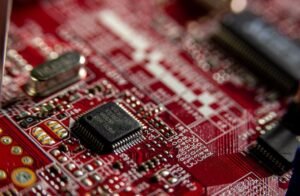Tesla Is a Data Company
Tesla, the innovative electric vehicle manufacturer, is not just in the business of making cars. under their sleek exterior, Tesla is essentially a data company. With its fleet of smart vehicles and advanced software, the company collects an immense amount of data, which fuels its autonomous driving technology and informs its product development strategies. This article explores how Tesla leverages data to drive innovation and revolutionize the automotive industry.
Key Takeaways
- Tesla is more than just a car manufacturer; it’s a data company.
- The company collects a vast amount of data from its fleet of smart vehicles.
- Tesla utilizes this data to develop its autonomous driving technology and improve its products.
- Data is crucial for Tesla’s ongoing innovation and competitive advantage.
The Power of Data
Tesla’s vehicles are equipped with a suite of sensors and cameras, allowing them to collect and analyze data on various aspects of the driving experience, such as road conditions, traffic patterns, and user behavior. This wealth of data provides Tesla with valuable insights that can be used to enhance its vehicle performance, design safer roads, and refine its autonomous driving capabilities. *By leveraging this data, Tesla can create a virtuous cycle of continuous improvement, ensuring that every new vehicle benefits from the knowledge gained from its predecessors.*
Data-Driven Innovation
Tesla’s data-driven approach enables it to be at the forefront of innovation in the automotive industry. The company regularly analyzes its data to identify patterns and optimize its vehicles and systems. *With information on millions of miles driven, Tesla can uncover trends in performance and reliability, allowing it to fine-tune its products and address any potential issues rapidly.* This iterative process of improvement based on real-world data sets Tesla apart from traditional automakers and accelerates its ability to introduce groundbreaking features.
Data in Autonomous Driving
One of Tesla’s ultimate goals is to achieve fully autonomous driving. Through its extensive data collection, Tesla gathers information on various driving scenarios, enabling it to train its Autopilot system and improve its machine learning algorithms. With each mile driven, Tesla’s vehicles become more capable of accurately interpreting and responding to real-world situations. *This data-driven approach is critical in developing a reliable and safe autonomous driving technology.* It allows Tesla to refine and enhance the performance of its vehicles continuously.
| Tesla’s Data Collection | Benefits |
|---|---|
| Gathers data on road conditions, traffic patterns, and user behavior | Provides valuable insights for vehicle performance optimization and safer road design |
| Enables Autopilot system training for autonomous driving | Improves machine learning algorithms and enhances vehicle performance |
Data for Product Development
Tesla’s data-driven mindset also extends to its product development strategies. By capturing data on how customers use their vehicles and interact with various features, Tesla gains valuable feedback to iterate and enhance both current and future products. *This customer-centric approach allows Tesla to tailor its offerings to meet the changing needs and preferences of its user base.* Furthermore, Tesla’s over-the-air software updates enable continuous product improvement, ensuring that customers always have access to the latest features and functionalities.
Data Security and Privacy
While Tesla harnesses the power of data to drive its innovation, it takes data security and privacy seriously. The company utilizes advanced encryption techniques to protect customer data and limits access to only authorized personnel. Tesla’s commitment to maintaining the privacy of its customers’ information ensures that data collection and usage are done ethically and responsibly.
| Data Collection and Usage | Privacy Protection |
|---|---|
| Collection of data on vehicle usage and customer behavior | Utilization of advanced encryption techniques |
| Anonymous data analysis for product development and improvement | Restricted access to customer data |
The Future of Tesla
As Tesla continues to collect and analyze vast amounts of data, its capabilities and innovations are poised to grow even further. With new vehicle models, expanded global reach, and ongoing improvements in autonomous driving technology, Tesla is driving the future of the automotive industry. *By harnessing the power of data, Tesla sets itself apart from the competition and paves the way for a more sustainable and connected mobility ecosystem.*

Common Misconceptions
1. Tesla is primarily an electric car company
One common misconception about Tesla is that it is purely an electric car company. While Tesla is known for its groundbreaking electric vehicles, it is important to understand that the company is more than just a car manufacturer.
- Tesla also develops sustainable energy products such as solar panels and energy storage solutions.
- The company has a significant focus on autonomous driving technology and is actively working on developing a self-driving car.
- Tesla also has a strong network of charging stations across several countries, which aids in the growth of electric vehicle adoption.
2. Tesla’s main source of revenue is car sales
Another misconception is that Tesla’s primary source of revenue comes from car sales alone. While it is true that selling electric vehicles is an important part of Tesla’s business, there are other revenue streams that contribute significantly to the company’s financial success.
- Tesla also generates revenue by selling clean energy credits to other car manufacturers who may not meet emissions standards.
- The energy storage solutions provided by Tesla, such as the Powerwall and Powerpack, have gained popularity and contribute to the company’s revenue.
- Tesla’s network of Supercharger stations also generates revenue through usage fees and partnerships with other automakers.
3. Tesla is just a car company competing with other automakers
Many people mistakenly think that Tesla competes solely with traditional automakers. While the company does operate in the automobile industry, Tesla’s focus extends beyond just manufacturing cars.
- Tesla’s advancements in battery technology and energy storage make it a competitor in the clean energy space as well.
- The development of autonomous driving technology puts Tesla in direct competition with tech companies working on similar solutions.
- With its Gigafactories and plans for vehicle manufacturing facilities in different parts of the world, Tesla is also establishing itself as a global manufacturing company.
4. Tesla’s success is solely because of government incentives
One misconception about Tesla is that its success is solely due to government incentives and subsidies. While government support has undoubtedly played a role in the company’s success, it is essential to recognize the other factors contributing to Tesla’s achievements.
- Tesla’s innovative electric vehicle designs and technology have garnered widespread acclaim and recognition.
- Elon Musk’s visionary leadership and his ability to drive innovation and disrupt industries have been fundamental to Tesla’s success.
- The company’s ability to create a strong brand image and a dedicated community of supporters has also been a significant factor in its growth.
5. Tesla’s data collection is invasive and compromising privacy
There is a misconception that Tesla’s data collection practices are invasive and compromise privacy. While Tesla does collect data from its vehicles, it is important to note that this data collection is primarily for improving the safety and performance of its products.
- Tesla uses data collected from its vehicles to help develop and improve autonomous driving technology.
- The collection of data also enables over-the-air software updates, which enhance the functionality and user experience of Tesla vehicles.
- Tesla prioritizes maintaining the privacy and security of its customers’ data and has implemented robust security measures to safeguard sensitive information.

Tesla’s Global Vehicle Sales
Tesla has experienced significant growth in global vehicle sales over the years. The table below highlights the number of vehicles sold by Tesla in different regions around the world.
| Year | North America | Europe | Asia-Pacific | Total |
|---|---|---|---|---|
| 2015 | 57,558 | 38,455 | 14,505 | 110,518 |
| 2016 | 76,243 | 50,942 | 18,981 | 146,166 |
| 2017 | 99,394 | 62,024 | 31,120 | 192,538 |
| 2018 | 186,300 | 98,462 | 81,348 | 366,110 |
| 2019 | 231,114 | 150,198 | 97,399 | 478,711 |
Tesla’s Supercharger Stations
Tesla has been expanding its global network of Supercharger stations, allowing efficient long-distance travel for its electric vehicles. The table below presents the number of Supercharger stations in different countries.
| Country | Number of Supercharger Stations |
|---|---|
| United States | 2,635 |
| Canada | 398 |
| Germany | 589 |
| China | 1,584 |
| United Kingdom | 472 |
Autonomous Driving Mileage by Tesla Vehicles
Tesla’s vehicles have covered an impressive number of autonomous driving miles. The table below demonstrates the mileage achieved by Tesla vehicles equipped with Autopilot technology.
| Year | Mileage (Million Miles) |
|---|---|
| 2016 | 0.2 |
| 2017 | 1.3 |
| 2018 | 4.2 |
| 2019 | 12.2 |
| 2020 | 22.5 |
Tesla Energy Storage Installations
Tesla is not only known for its vehicles but also for pioneering energy storage solutions. The following table showcases the number of energy storage installations completed by Tesla over the years.
| Year | Number of Installations |
|---|---|
| 2015 | 2,795 |
| 2016 | 4,888 |
| 2017 | 8,017 |
| 2018 | 10,061 |
| 2019 | 13,612 |
Tesla’s Solar Panels Installed Capacity
Tesla is involved in sustainable energy solutions, including solar panels installations. The table below presents the cumulative installed solar capacity by Tesla over the years.
| Year | Installed Capacity (MW) |
|---|---|
| 2015 | 0.29 |
| 2016 | 0.87 |
| 2017 | 2.64 |
| 2018 | 4.09 |
| 2019 | 6.27 |
Tesla’s Gigafactories
Tesla operates several massive Gigafactories worldwide. The table below provides an overview of the existing Gigafactories and their locations.
| Gigafactory | Location | Size (Square Feet) |
|---|---|---|
| Gigafactory 1 | Sparks, Nevada, USA | 5,300,000 |
| Gigafactory 2 | Buffalo, New York, USA | 1,200,000 |
| Gigafactory 3 | Shanghai, China | 7,900,000 |
| Gigafactory 4 | Berlin, Germany | 5,000,000 |
| Gigafactory 5 | Austin, Texas, USA | 4,500,000 |
Tesla’s Market Capitalization Growth
Tesla’s market capitalization has experienced remarkable growth, making it one of the most valuable companies. The table below showcases Tesla’s market capitalization at different points in time.
| Date | Market Capitalization (Billions of USD) |
|---|---|
| January 1, 2019 | 54.6 |
| January 1, 2020 | 76.7 |
| January 1, 2021 | 669.1 |
| July 1, 2021 | 623.7 |
| November 1, 2021 | 1,054.4 |
Tesla’s Workforce Growth
Tesla has significantly expanded its workforce over the years to fuel its growth and innovation. The table below presents the number of Tesla employees.
| Year | Number of Employees |
|---|---|
| 2011 | 6,000 |
| 2015 | 14,820 |
| 2018 | 45,000 |
| 2020 | 70,757 |
| 2021 | 88,000 |
Throughout its evolution, Tesla has transcended the conventional notion of being solely an automotive company. The tables showcased various aspects of Tesla’s diverse operations, including global vehicle sales, Supercharger stations, autonomous driving mileage, energy storage installations, solar panel capacity, Gigafactories, market capitalization, and workforce growth. From manufacturing electric vehicles to developing sustainable energy solutions, Tesla has strategically positioned itself as an innovative data-driven company at the forefront of technological advancements.
Frequently Asked Questions
What does Tesla do with the data it collects from its vehicles?
Tesla collects data from its vehicles to improve and develop its autonomous driving technology. This data is analyzed to enhance safety features, optimize vehicle performance, and to make continuous improvements to their software and hardware systems.
How does Tesla handle customer data security?
Tesla takes customer data security seriously. They use state-of-the-art security measures to protect the data they collect. The data is stored securely, and access to it is restricted to authorized personnel only. Tesla also anonymizes and aggregates data to ensure user privacy.
Can Tesla access personal data from its vehicles without user consent?
Tesla respects user privacy and only accesses personal data with user consent or when required by law. The company prioritizes data protection and follows strict policies and regulations governing the collection and use of personal information.
Does Tesla sell customer data to third parties?
No, Tesla does not sell customer data to third parties. They prioritize user privacy and maintain strict control over the data they collect. Any data sharing is done within legal frameworks and with user consent.
How does Tesla use data to improve its vehicles?
Tesla uses data to gain insights into vehicle performance, driving patterns, and potential issues. This information helps them identify areas for improvement and refine their vehicles’ design, functionality, and safety features.
Where is the data collected by Tesla’s vehicles stored?
Tesla stores the data collected by its vehicles in secure servers. The location of these servers may vary, but they ensure that data is stored in compliance with applicable data protection laws and regulations.
Does Tesla collect data when vehicles are not in use?
Yes, Tesla vehicles collect data even when they are not in use. This allows Tesla to gather information on various parameters such as battery health, software performance, and environmental conditions. This continuous data collection helps improve the overall Tesla vehicle experience.
Can Tesla owners access the data collected by their vehicles?
Yes, Tesla owners have access to some of the data collected by their vehicles. Tesla provides a user-friendly interface that allows owners to review their vehicle’s performance metrics, energy usage, and other relevant information.
Does Tesla use data to enhance autonomous driving capabilities?
Yes, Tesla uses data to enhance its autonomous driving capabilities. The vast amount of data collected from Tesla vehicles enables the company to refine and improve its Autopilot feature, making it safer and more reliable over time.
How does Tesla ensure data privacy while using it to improve their technology?
Tesla employs robust data privacy measures to protect user information while utilizing it to enhance their technology. They strictly adhere to privacy regulations, anonymize personal data, and use aggregated data for analysis, ensuring individual privacy is respected.




